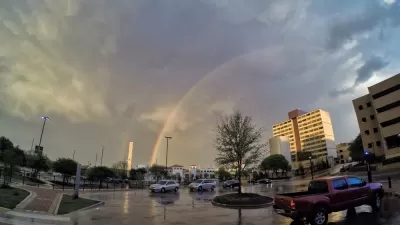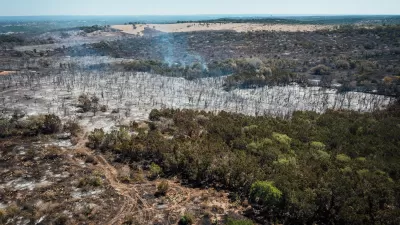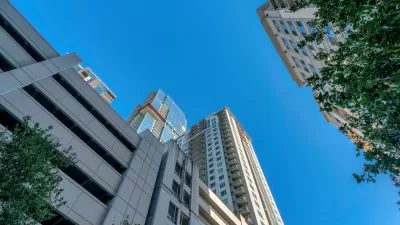An op-ed by David Heymann produces an elaborate, protracted metaphor of Austin as a former youthful "golden child" now showing the least attractive possible traits of middle age.
(Updated 04/06/15) "Since the biological paradigm that explains cities as entities remains in vogue, here is my biological analogy for the city of Austin. Get ready for hyperbolic overstatement," writes David Heymann at the beginning of the op-ed in warning about the withering critique that follows.
The next paragraph reads as follows:
"Once blessed with a golden youth, and since then — having had that youthful image reinforced often enough by its many admirers — spared the crisis of having to figure out how that charm might continue once the blush wore off, Austin has grown into a somewhat lazy and troubling adult, with unpromising habits (Yeah, I'm thinking I really want to be an Event City...)."
Much of Heymann's critique centers on issues of planning and development. For instance the following paragraph, full of references that will be familiar to anyone well versed in the history of the city's land use regulations:
"Though little aging in the sense of decline has taken place, a pudgy truth is evident. There is a noticeable widening (Wait, I'm the 11th largest WHAT in America?); an uneven densening of the middle (Some of that is new core muscle, dude!); sudden unwanted hair in problematic locations (Not my fault! Those oddly sprouting towers are a side effect of my capitol view corridor inoculation!); a marked hardening of the arteries slowing the circulatory metabolism (Not fair; that's genetic! And I'm getting a stent in my MoPac.); and the beginnings of a patchy, beige blemishing (Okay, I got that from going to a lot of cheap hotels.)."
Eventually Heymann ceases with the metaphor and voices concern that Austin is becoming a place of more cynicism than hope and bereft the inherent optimism of its neighbors, Dallas and Houston.
Article link has been updated to provide access without a paywall.
FULL STORY: Austin, my middle-aged city

Alabama: Trump Terminates Settlements for Black Communities Harmed By Raw Sewage
Trump deemed the landmark civil rights agreement “illegal DEI and environmental justice policy.”

Study: Maui’s Plan to Convert Vacation Rentals to Long-Term Housing Could Cause Nearly $1 Billion Economic Loss
The plan would reduce visitor accommodation by 25% resulting in 1,900 jobs lost.

Planetizen Federal Action Tracker
A weekly monitor of how Trump’s orders and actions are impacting planners and planning in America.

Waymo Gets Permission to Map SF’s Market Street
If allowed to operate on the traffic-restricted street, Waymo’s autonomous taxis would have a leg up over ride-hailing competitors — and counter the city’s efforts to grow bike and pedestrian on the thoroughfare.

Parklet Symposium Highlights the Success of Shared Spaces
Parklets got a boost during the Covid-19 pandemic, when the concept was translated to outdoor dining programs that offered restaurants a lifeline during the shutdown.

Federal Homelessness Agency Places Entire Staff on Leave
The U.S. Interagency Council on Homelessness is the only federal agency dedicated to preventing and ending homelessness.
Urban Design for Planners 1: Software Tools
This six-course series explores essential urban design concepts using open source software and equips planners with the tools they need to participate fully in the urban design process.
Planning for Universal Design
Learn the tools for implementing Universal Design in planning regulations.
Caltrans
Smith Gee Studio
Institute for Housing and Urban Development Studies (IHS)
City of Grandview
Harvard GSD Executive Education
Toledo-Lucas County Plan Commissions
Salt Lake City
NYU Wagner Graduate School of Public Service





























